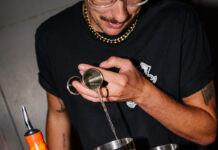Beer quality is a ‘must’ in current climate, specialist firms say

WITH finances tight for many businesses, good cellar management has never been so important for on-trade operators.
Specialists in the field have told SLTN that the recession has had a tangible impact on cellar management.
Jim Cunningham of Beer Piper said operators have upped their game in the current economic climate.
“Efficiency and cost-saving are much higher on the agenda,” he said.
“We’ve noticed more of our long-standing customers are keen to make sure they get the maximum benefit from their systems, especially training their staff to identify every opportunity to minimise beer wastage.
“Every penny counts towards the bottom line and managing the cellar effectively can help reduce costs and avoid unnecessary wastage.”
But Steve Lakin of Innserve expressed concern about another way in which the recession has impacted on cellar management.
While some operators are saving money by reducing wastage through new equipment and staff training, he said others may be embracing riskier cost-cutting measures.
“With the economic downturn, we have seen cellar standards slip as the price of beer has increased,” he said.
“Throughputs have been reduced, cleaning regimes are slipping, and beer is being kept on sale longer.
“If cellar management slips, the quality of a pint drops and problems with fobbing beer will quickly occur, as will an increase in customer dissatisfaction, who are likely to demonstrate their disappointment by drinking elsewhere.
“A single drip tray of waste per line per day in a standard pub can cost up to £14,000 a year in lost sales – a significant amount of money.
“A penny saved is a penny earned, but it’s not all about saving money.
“Effective cellar management has a direct impact on minimising waste and optimising the quality of draught beers.”
Both cellar management experts had advice on how to avoid common mistakes.
Cunningham said failing to clean lines often enough is a malpractice that can cause quality to “rapidly” decline.
“The other big mistake is leaving the lights on in the cellar,” he said.
“Not only does this waste electricity but it encourages the yeast to grow in the pipes; without the light it can’t grow as fast.”
At Innserve, Lakin said in many cases standards have been allowed to slip and the bar for acceptable cellar management has dropped in recent years.
“At trade shows it’s become a common refrain to hear that it’s alright to leave line cleaning for a ‘couple of weeks’ and that it’s ‘common sense’ to switch off beer coolers and cellar cooling overnight,” he said.
He advised publicans to take a proactive approach to cellar management.
“Lines should be cleaned every seven days, cellar temperature should be constantly monitored to ensure it is correct for the beer being stored, and stock levels should be regularly checked, as should sell by dates, to ensure products are sold within their recommended ‘on sale’ time,” he said.
“Glassware is also important. It should be ensured that glasses are clean before serving a pint and glasses should be checked regularly to see if they need replacing.”
Cunningham stressed the importance of good cellar management to beer quality.
“Serving a poor quality pint is a sure way to lose customers,” he added.
“Ensuring the beer lines are well maintained and keeping a good record of your line cleaning activity helps to keep quality consistent.”



















